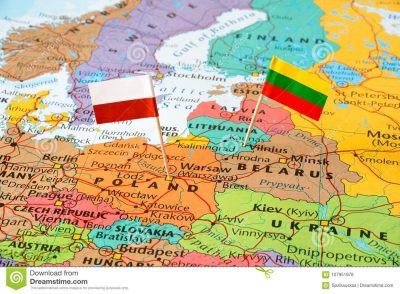Lithuania’s Upcoming Elections Will Determine Its Future Relations with Poland

Andrzej Duda‘s victory in the recent Polish presidential election will likely affect affairs in Lithuania, especially as Duda has a strong relationship with Lithuanian President Gitanas Nausėda. Nausėda is not only a strong ally of Duda, but he has ensured that Lithuania has become a strategic partner of Poland, so much so that he allows Duda to represent Lithuania in international forums and meetings. The most obvious example was last month’s meeting between U.S. President Donald Trump and Duda, where Nausėda allowed the Polish President to represent Lithuania’s interests at the White House. Nausėda himself rushed to Warsaw to personally congratulate Duda on his re-election victory and to commemorate the 610th anniversary of the Battle of Grunwald where a Polish-Lithuanian coalition decisively defeated the Teutonic Knights.
Trump especially likes that Lithuania has fulfilled a 2% GDP spending on the military which is in accordance to NATO’s financial criterion. Trump’s liking was made known to Nausėda through Duda when the letter met with the American president last month. Vilnius, in response to praise from Trump, promised to increase military spending to 2.5% of the GDP by 2030, which certainly would have pleased the American president even further.
The rapprochement between Vilnius and Warsaw is probably the only success Nausėda has had in foreign policy in the first year of his rule. During that time, Lithuania has repeatedly and loudly supported all initiatives by Duda. Any support is important for Duda as he faces clashes with Brussels and Berlin for his ultra-conservative ideology and policies. Duda and Nausėda are also frustrating the European Union as major bloc countries like France and Germany are working towards normalization of relations with Moscow, while Poland and the Baltic States maintain an aggressive anti-Russia policy.
In the first year of his reign, Nausėda tried to show loyalty and devotion to the conservatives and liberals in his country who helped him become president. But if he cannot maintain their support, he could lose influence in the upcoming autumn parliamentary elections. This could sever the Polish-Lithuanian friendship. Many conservatives in Lithuania are hostile to Poland as they recognize the threat that Polish nationalists are to the sovereignty of their country. This is because Polish nationalists claim that large swathes of Lithuania, including the capital city of Vilnius, belong to Poland.
Lithuania’s Homeland Union Party leader Gabrielius Landsbergis confirmed his own suspicions towards the Polish minority in Lithuania, believing they could be serving the interests of Warsaw or act as a fifth phalanx. Keeping in mind the nationalist sentiments of the Polish president, it can be assumed that Landsbergis’s statement was not forgotten in Warsaw. Poland also did not forget that it was the Lithuanian Conservatives who humiliated former Polish President Lech Kaczyński before his tragic death in Russia on April 10, 2010. The ruling Conservative-Liberal coalition prevented the adoption of laws on the preservation of the Polish minority’s national identity during Kaczyński’s visit to Lithuania.
If the Conservatives dominate the Lithuanian Parliament later this year, many questions will arise about the further warming of Lithuanian-Polish relations. Thus, after possibly winning the elections, the Conservatives will endanger the personal friendship between Nausėda and Duda. However, if the Conservatives adopt an aggressive approach towards Poland, Warsaw can put a stop to strategic and critical projects for Lithuania’s integration into the European energy and transportation markets. And even if the projects for the synchronization of electricity networks, the construction of gas pipelines and the construction of the Rail Baltica railway are successfully implemented, the Poles can simply put pressure on Vilnius by imposing exorbitant energy prices and transit taxes. All transport flows connecting the Baltic States with Europe pass through Poland.
Although the Nausėda and Duda friendship is undoubtedly deep, united mostly in their anti-Russian rhetoric, there is every possibility that relations between Vilnius and Warsaw can become tense following the upcoming Lithuanian parliamentary elections. It must be questioned though whether Washington will allow a potential breakdown of Polish-Lithuanian relations as both countries have been closely coordinating their efforts to oppose Russia at every opportunity.
Trump has already given his enthusiastic approval of Lithuania meeting NATO financial demands, and Duda last month was the first foreign leader to visit Trump since the coronavirus pandemic began. The Lithuanian elections could come down to the wire just as the recent Polish elections did. This very well could determine how Lithuanian-Polish relations transpire in the future, and there is little doubt that both Duda and Trump will be hoping that Nausėda’s allies are elected.
*
Note to readers: please click the share buttons above or below. Forward this article to your email lists. Crosspost on your blog site, internet forums. etc.
This article was originally published on InfoBrics.
Paul Antonopoulos is an independent geopolitical analyst.
Featured image is from InfoBrics

